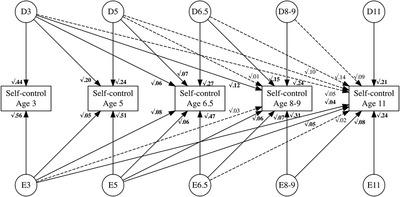Our official English website, www.x-mol.net, welcomes your
feedback! (Note: you will need to create a separate account there.)
The special role of middle childhood in self-control development: Longitudinal and genetic evidence
Developmental Science ( IF 3.1 ) Pub Date : 2022-04-18 , DOI: 10.1111/desc.13270 Roni Pener-Tessler 1 , Noam Markovitch 1 , Ariel Knafo-Noam 1
Developmental Science ( IF 3.1 ) Pub Date : 2022-04-18 , DOI: 10.1111/desc.13270 Roni Pener-Tessler 1 , Noam Markovitch 1 , Ariel Knafo-Noam 1
Affiliation

|
Despite the importance of self-control for well-being and adjustment, its development from early childhood to early adolescence has been relatively understudied. We addressed the development of mother-reported self-control in what is likely the largest and longest longitudinal twin study of the topic to this day (N = 1889 individual children with data from at least one of five waves: ages 3, 5, 6.5, 8–9 and 11 years). We examined rank-order change in self-control from early childhood to early adolescence, genetic and environmental contributions to variance in the trait and differential developmental trajectories. The relative contribution of genetic and environmental factors to change and stability was also examined. Results point at middle childhood as a period of potential transition and change. During this period the rank-order stability of self-control increases, heritability rates substantially rise, and a cross-over occurs in two of the self-control trajectories. Nonadditive genetic effects contribute to both stability and change in self-control while the nonshared environment contributes mostly to change, with no effect for the shared environment. Our findings suggest that new genetic factors, that emerge around age 6.5 and whose effect on self-control is carried on along development, may partially account for changes in self-control around late middle childhood, and explain the growing stability in the trait approaching early adolescence. We discuss the implications of the special role of middle childhood for self-control development.
中文翻译:

童年中期在自我控制发展中的特殊作用:纵向和遗传证据
尽管自我控制对幸福和调整很重要,但其从幼儿期到青春期早期的发展却相对缺乏研究。我们在迄今为止可能是该主题最大和最长的纵向双胞胎研究中讨论了母亲报告的自我控制的发展(N = 1889 名儿童,其数据至少来自五波之一:3 岁、5 岁、6.5 岁、8-9 岁和 11 岁)。我们检查了从儿童早期到青春期早期自我控制的等级顺序变化,遗传和环境对性状变化和不同发展轨迹的贡献。还检查了遗传和环境因素对变化和稳定性的相对贡献。结果表明,童年中期是一个潜在的过渡和变化时期。在此期间,自我控制的等级顺序稳定性增加,遗传率大幅上升,并且两条自我控制轨迹发生交叉。非加性遗传效应有助于自我控制的稳定性和变化,而非共享环境对变化的贡献最大,对共享环境没有影响。我们的研究结果表明,在 6.5 岁左右出现的新的遗传因素,其对自我控制的影响是在发育过程中进行的,可能部分解释了儿童中期晚期自我控制的变化,并解释了接近早期的性状越来越稳定青春期。我们讨论了童年中期对自我控制发展的特殊作用的影响。
更新日期:2022-04-18
中文翻译:

童年中期在自我控制发展中的特殊作用:纵向和遗传证据
尽管自我控制对幸福和调整很重要,但其从幼儿期到青春期早期的发展却相对缺乏研究。我们在迄今为止可能是该主题最大和最长的纵向双胞胎研究中讨论了母亲报告的自我控制的发展(N = 1889 名儿童,其数据至少来自五波之一:3 岁、5 岁、6.5 岁、8-9 岁和 11 岁)。我们检查了从儿童早期到青春期早期自我控制的等级顺序变化,遗传和环境对性状变化和不同发展轨迹的贡献。还检查了遗传和环境因素对变化和稳定性的相对贡献。结果表明,童年中期是一个潜在的过渡和变化时期。在此期间,自我控制的等级顺序稳定性增加,遗传率大幅上升,并且两条自我控制轨迹发生交叉。非加性遗传效应有助于自我控制的稳定性和变化,而非共享环境对变化的贡献最大,对共享环境没有影响。我们的研究结果表明,在 6.5 岁左右出现的新的遗传因素,其对自我控制的影响是在发育过程中进行的,可能部分解释了儿童中期晚期自我控制的变化,并解释了接近早期的性状越来越稳定青春期。我们讨论了童年中期对自我控制发展的特殊作用的影响。











































 京公网安备 11010802027423号
京公网安备 11010802027423号